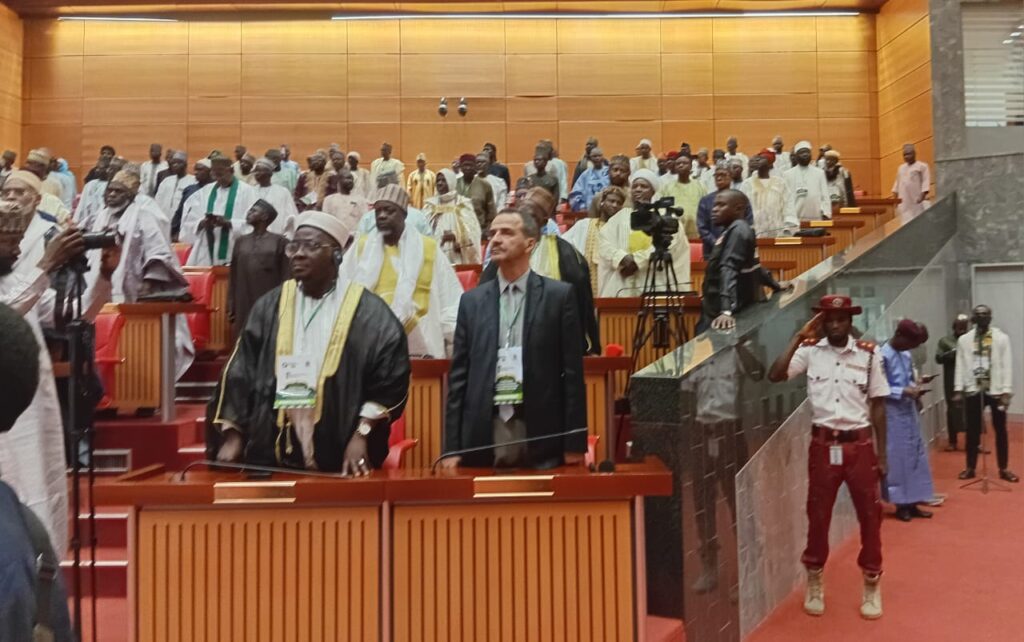ECOWAS, African Union and West African Islamic Leaders Partner to Counter Violent Extremism, Reform Almajiri Education.
By Raymond Enoch
The Economic Community of West African States (ECOWAS) and leading Islamic scholars across the sub-region have renewed their commitment to peace, security, and education reforms during the First West African Islamic Conference on Security and Governance, held at the ECOWAS Parliament in Abuja.

The three-day conference, jointly organized by the ECOWAS Commission and the Jam’iyyatu Ansariddeen Attijjaniyya, focused on the theme: “The Role of Islamic Organisations in Countering Terrorism and Violent Extremism in West Africa and the Sahel.” It brought together over 200 delegates from twelve ECOWAS member states, including representatives of the African Union, the United Nations, UNICEF, UNESCO, and INTERPOL.
In his address at theclosing ceremony, the ECOWAS Commission President, H.E. Dr. Omar Alieu Touray, emphasized the urgent need for non-kinetic approaches in combating terrorism, stressing the role of Islamic institutions in promoting peace and social stability. He noted that “terrorism and violent extremism have taken root within our communities, making it imperative to empower local and religious structures that influence minds and shape values.”
Dr. Touray also drew attention to the condition of traditional Qur’anic schools—known as Tsangaya, Makaranta, or Daara across the region—and their vital role in preventing radicalization. “We must modernize and reform these schools to become centers of learning and economic empowerment,” he said, commending the leadership of Jam’iyyatu Ansariddeen Attijjaniyya for championing this reform agenda.
The ECOWAS President further praised ongoing national initiatives such as Nigeria’s newly established National Commission for Almajiri and Out-of-School Children Education and Ghana’s move toward a unified Makaranta Curriculum. He acknowledged similar efforts in Senegal aimed at eradicating child street begging and strengthening Islamic educational structures.
The African Union’s High Representative for Silencing the Guns, Dr. Mohammed Ibn Chambas, co-chaired the conference alongside Islamic clerics and policymakers. Discussions spanned eleven sessions over three days, addressing issues from the socioeconomic roots of extremism to the reform of Islamic education systems.
At the end of deliberations, participants adopted a set of resolutions emphasizing educational reform, peacebuilding, and collaboration between governments and faith-based organizations. The communique called for Integration of Islamic and formal education systems to strengthen moral and academic learning, increased collaboration among religious scholars, security agencies, and governments to counter radical ideologies,capacity building for Imams in mediation and peace dialogue, greater investment in youth empowerment, skill acquisition, and digital literacy, strengthening community-based peace structures andearly-warning mechanisms, cooperation between Muslims and Christians to defeat terrorism and promote mutual understanding.
The conference concluded with ECOWAS’ pledge to partner with Jam’iyyatu Ansariddeen Attijjaniyya, the African Union, and the United Nations to implement follow-up projects supporting the modernization of traditional Qur’anic schools.
Dr. Touray reaffirmed that “protecting our schools, empowering our youths, and fostering interfaith unity are indispensable to defeating violent extremism and ensuring lasting peace in West Africa.”
The meeting ended with a shared commitment to build a region anchored on peace, knowledge, and moral development — a West Africa secure from extremism and united for prosperity.







